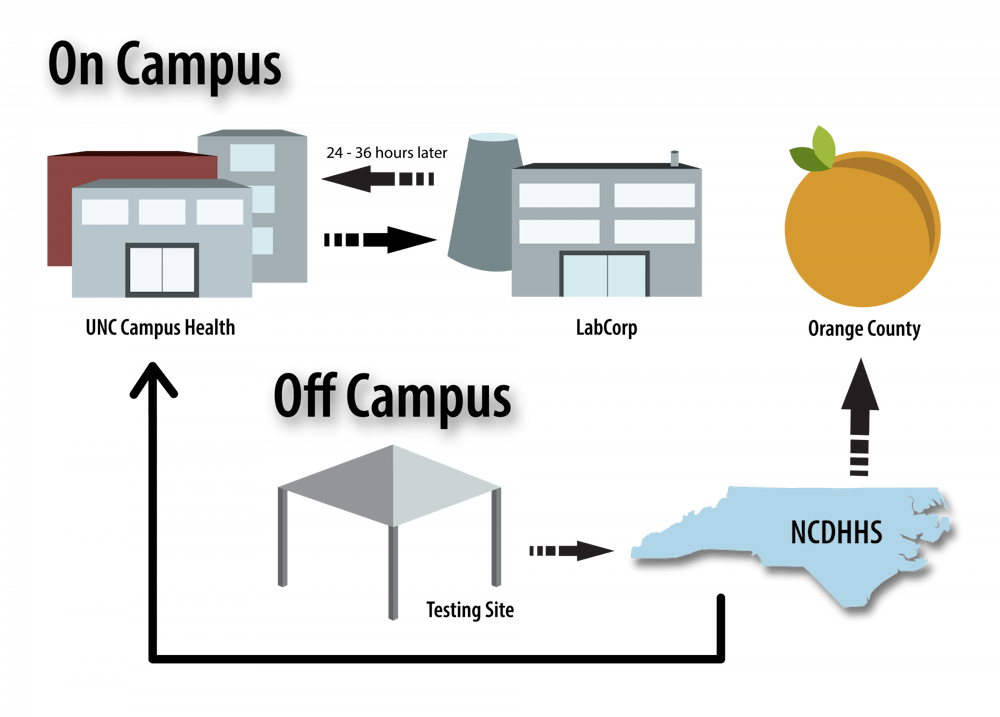“Students who receive positive test results from an outside testing location are asked to let Campus Health know as soon as possible so contact tracing can be initiated,” Media Relations said. “Otherwise, Campus Health must rely on the timeliness of the outside testing location to report results to the Orange County Health Department.”
Orange County Community Relations Director Todd McGee said in a statement that test results are not typically reported directly to the county. The tests are sent to the N.C. Department of Health and Human Services, McGee said.
The NCDHHS COVID-19 Dashboard clarifies that the testing turnaround time varies.
According to the dashboard, factors that impact the turnaround time are how and when the specimen is transported to a laboratory, when the laboratory has a result and the time between when a laboratory determines a result and the laboratory electronically reported to NCDHHS.
The dashboard indicates that the fourth stage is reliant on the health care provider reporting back to the patient.
Communication delays
Last Thursday, the Orange County Health Department announced a cluster at Cobb Residence Hall, then later retracted it as a "typo."
McGee said there was a misunderstanding in communication with UNC regarding the announcement of this cluster on Aug. 27.
“The information we had received didn’t match what the University had released,” McGee said. “So when we noticed the discrepancy, we deferred to the University and removed Cobb from our list.”
The University announced the cluster hours later.
“The information is typically a day behind because the data for the daily update is submitted earlier in the day so that the dashboard can be updated by close of business," UNC Media Relations said.
The positivity rate for campus testing for the week of Aug. 24 was 41.3 percent as of Sep. 3, according to the COVID-19 dashboard.
To get the day's news and headlines in your inbox each morning, sign up for our email newsletters.
This was up about 9 percent from the prior week, which currently reads as a 32.2 percent positivity rate.
Media Relations said there was a discrepancy in the positive rate for Sep. 1, which reflected a 29 percent positive rate. They said the error was due to a disparity between the total number of tests.
As for the students who test positive off campus, they are required to self-report positive results to Campus Health.
“CVS didn’t ask if I was a student or anything, so I don’t think they would have been able to associate the testing with UNC anyway,” said Neil Mehta, a graduate student at the Kenan-Flagler Business School who was tested at an off-campus site.
Mehta said he was never in contact with the school. He said though he tested negative, a positive result off campus could easily avoid being reported.
“Failure to comply with this guideline may result in administrative action, including, but not limited to, restriction on access to or use of University facilities, removal from University housing, dis-enrollment from one or more in-person courses, transition to remote-only instruction and/or other interventions necessary to effect compliance and protect the well-being of the campus community," the Carolina Together website states.
Asymptomatic cases
Rachel Graham, an assistant professor of epidemiology in the Gillings School of Global Public Health, spoke about asymptomatic cases and an unpublished study on the case of the “Diamond Princess” – a cruise ship of 3,711 passengers, including crew members, that was quarantined in February of this year.
“It was believed that about 50 percent of the positive tests were asymptomatically infected," Graham said.
Graham said crew members were not isolated, but the passengers were isolated as much as possible. She related these results to higher amount of asymptomatic cases in young people.
“So this is not a small matter," Graham said. "Just because you're asymptomatic does not mean that you can't spread it, you're not dangerous. It really only means you’re not dangerous to yourself, but you are significantly dangerous to the rest of the community because you don’t know to isolate yourself.”
university@dailytarheel.com




